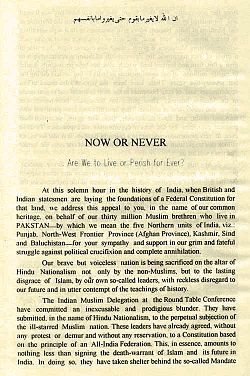- Pakistan Declaration
-
The Pakistan Declaration (titled Now or Never; Are We to Live or Perish Forever?) was a pamphlet published on 28 January 1933 by Choudhary Rahmat Ali, and was supported by Muhammad Aslam Khan Khattak, Sahibzada Sheikh Mohd Sadiq, Inayat Ullah Khan in which the word Pakistan was used for the first time and was presented in the round table conference in 1933. The pamphlet started with this famous sentence:[1]
“ At this solemn hour in the history of India, when British and Indian statesmen are laying the foundations of a Federal Constitution for that land, we address this appeal to you, in the name of our common heritage, on behalf of our thirty million Muslim brethren who live in PAKSTAN - by which we mean the five Northern units of India, Viz: Punjab, North-West Frontier Province (Afghan Province), Kashmir, Sind and Baluchistan. ” The pamphlet asked that "the five Northern units of India" - Punjab, North-West Frontier Province (Afghan Province), Kashmir, Sindh and Baluchistan (or Pakstan)[2] become a state independent of the proposed Indian Federation.
Professor K.K.Aziz writes[3] that "Rahmat Ali alone drafted this declaration[4] (in which the word Pakistan was used for the first time), but in order to make it "representative" he began to look around for people who would sign it along with him. this search did not prove easy for "so firm was the grip of 'Indianism' on our young intellectual at English universities that it took me (Rahmat Ali) more than a month to find three young men in London who ........offered to support and sign it ."[5]
After the publication of the pamphlet, the Hindu Press vehemently criticized it, and the word 'Pakistan' used in it. Thus this word became a heated topic of debate and the name of Pakistan grew in popularity and led to the commencement of Pakistan Movement, and consequently the creation of Pakistan as an independent state in 1947.
The author

The author of this famous pamphlet was Chaudhary Rahmat Ali(November 16, 1897 - February 3, 1951), a Muslim nationalist from Punjab,[6][7][8] who was one of the earliest proponents of the creation of the state of Pakistan. He is credited with creating the name "Pakistan" for a separate Muslim homeland in South Asia. He propagated the Scheme of Pakistan with a missionary zeal since its inception in 1933. He also founded Pakistan National Movement to propagate his ideas. Being as a political thinker and an idealist, he condemned Muhammad Ali Jinnah for accepting a smaller Pakistan in 1947. He wanted to save every Indian Muslim from Hindu domination.
He had been voicing his dissatisfaction with the creation of Smaller Pakistan ever since his arrival in Lahore on April 6, 1948. He was unhappy over a Smaller Pakistan than the one he had conceived in his 1933 pamphlet Now Or Never.[citation needed]
After the creation of Pakistan he returned to Pakistan in April 1948, planning to stay in this country, but he was ordered by the then Prime Minister Liaqat Ali Khan to leave the country. His belongings were confiscated, and he left empty-handed for England in October 1948.
He died on 3 February 1951 and was buried on 20 February at Newmarket Road Cemetery, Cambridge, UK. As there was no one to take responsibility for his burial, Emmanuel College's Master, who had been Rahmat Ali's Tutor, himself arranged the burial in Cambridge on 20 February 1951.
References
- ^ "Now or Never; Are We to Live or Perish Forever?"
- ^ THE HISTORY MAN: Cambridge remembers Rahmat Ali —Ihsan Aslam - Daily Times
- ^ Rahmat Ali: A Biography, by K.K. AZIZ, Vanguard ,1987 ,Lahore, 1987. P.85
- ^ "Now or Never; Are We to Live or Perish Forever?"
- ^ Chaudhry Rahmat Ali, Pakistan
- ^ http://books.google.co.in/books?id=9q21AAAAIAAJ&dq=rehmat+ali+gurjar+pak&q=gujjar#search_anchor Rahmat Ali: a biography By Khursheed Kamal Aziz
- ^ http://books.google.co.in/books?lr=&id=KSluAAAAMAAJ&dq=rehmat+ali+gujjar&q=gujjar#search_anchor Iqbal: the spiritual father of Pakistan By Rashida Malik
- ^ http://books.google.co.in/books?lr=&id=F5QBAAAAMAAJ&dq=rehmat+ali+gujjar&q=gujjar#search_anchor Complete works of Rahmat Ali, Volume 1 By Choudhary Raḣmat ʻAlī, Khursheed Kamal Aziz
External links
- http://www.chaudhryrahmatali.com/now%20or%20never/index.htm "Now or Never; Are We to Live or Perish Forever?"
- http://www.isn.ethz.ch/isn/Digital-Library/Primary-Resources/Detail/?ots591=69F57A17-24D2-527C-4F3B-B63B07201CA1&lng=en&id=106451
Categories:- Pakistan Movement
- Pamphlets
- Pakistani political terms
Wikimedia Foundation. 2010.

